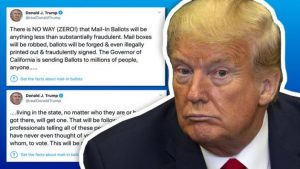Is Twitter a content publisher or a social media platform?
Twitter insists it is a social media platform, but by adding a fact-checking label to posts by President Trump it is behaving more like a content publisher.
On May 26, the president expressed concern in a Twitter post about mail-in ballots, saying that such a practice, if widespread, would lead to fraud and a “rigged election.” Twitter later added a warning label to the post that reads, “Get the facts about mail-in ballots.”
The label links to a Twitter article that is headlined, “Trump makes unsubstantiated claim that mail-in ballots will lead to voter fraud.”
The message under the headline reads, in part: “These claims are unsubstantiated, according to CNN, Washington Post, and others. Experts say mail-in ballots are very rarely linked to voter fraud.”
The article also includes three points under the title, “What you need to know.”
The fact-checking label is concerning because it sends people to a list of content that Twitter deems to be factual, such as certain media organizations, and non-media accounts that have been verified by the platform.
The move has “dangerous” and “far-reaching implications,” and fairness and consistency will be hard to guarantee moving forward, say social media experts.
Andrew Selepak, social media professor at the University of Florida, argues that “Twitter is essentially telling users who can and who cannot be trusted and labeling content from some users as untrustworthy. Determining what is true and false … is what a content publisher would do—and not a social media platform.”
If deemed a publisher, Twitter may no longer be protected under Section 230 of the Communications Decency Act and therefore could be subject to government regulation.
In effect, Twitter is not allowing users to decide for themselves what they believe. If a platform makes that decision for users, that platform is Behaving more like a publisher than serving a role as a public sphere.
In a statement to media outlets on May 26, Twitter said that Trump’s posts about mail-in voting “contain potentially misleading information about voting processes and have been labeled to provide additional context.” Twitter noted that the post doesn’t violate its rules because “it does not directly try to dissuade people from voting.”
Twitter also pointed to a new policy that indicates it “may use these labels and warning messages to provide additional explanations or clarifications in situations where the risks of harm associated with a tweet are less severe but where people may still be confused or misled by the content.”
However, legal experts who specialize in cyberlaw, say Twitter has opened a can of worms. No one wants to see misinformation on social media but … how will Twitter ensure fairness and consistency? Twitter has opened itself up for major headaches.
Will this new policy apply to other politicians? Which ones? Will all tweets be fact-checked or just some? Who will determine the veracity of a tweet?”
President Trump didn’t wait to find out. He signed an executive order Thursday seeking to crack down on social-media companies over allegations of bias against conservatives. Trump’s executive order seeks to empower federal regulators to amend Section 230 of the Communications Decency Act, which gives social-media companies broad authority to moderate speech on their platforms.
“We’re here today to defend free speech from one of the greatest dangers,” Trump said before signing the executive order in the Oval Office where Attorney General Bill Barr was present.
The president added, “This censorship and bias is a threat to freedom itself. Imagine if your phone company silenced or edited your conversation. Social media companies have vastly more power in the United States than newspapers, they’re by far richer than any other traditional forms of communication.”
Trump vowed that social media companies “that engage in censoring or any political company will not be able to keep their liability shield.”
“My executive order further instructed the Federal Trade Commission to prohibit social media companies from engaging in any deceptive acts or practices,” said the commander in chief who at one point held up a copy of Thursday’s Post featuring one of the members of Twitter’s policing team who once called the president a “racist tangerine.”
The order seeks to create new regulations for how social-media companies are allowed to moderate speech, and it calls for the Federal Trade Commission to keep a list of complaints from users about political bias on social media platforms.
Meanwhile, Trump’s 2020 campaign manager, Brad Parscale, said in a statement that Twitter has a “clear political bias.”
“We always knew that Silicon Valley would pull out all the stops to obstruct and interfere with President Trump getting his message through to voters,” Parscale said.
“Partnering with the biased fake news media ‘fact-checkers’ is only a smokescreen Twitter is using to try to lend their obvious political tactics some false credibility. There are many reasons the Trump campaign pulled all our advertising from Twitter months ago, and their clear political bias is one of them.”


